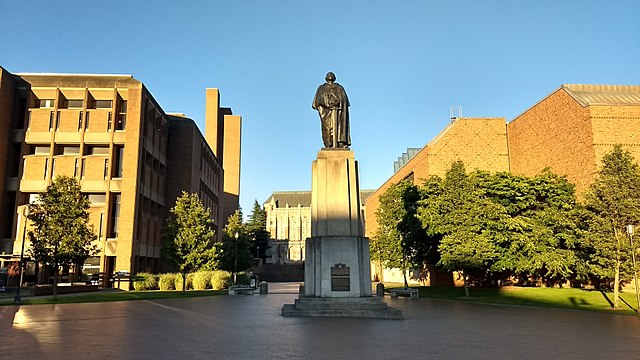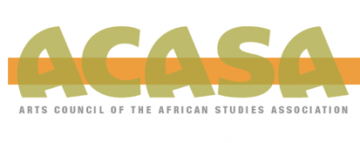CAA News Today
CAA Advocacy Statement
posted by Allison Walters — February 03, 2021
In the past year we have experienced unprecedented changes in the social, economic, and interpersonal landscape: transformations in higher education; financial uncertainty; home-work imbalance; quarantine during a global pandemic; a divisive political climate; the US election cycle; and the Black Lives Matter and #SayHerName protests following the violent killings of Ahmaud Arbery, Breonna Taylor, George Floyd, and so many more. We have seen changes for us as teachers, scholars, makers, writers, and advocates for higher education and the place of academic arts discourse and development in this new world. We have seen great inequities in and serious changes to higher education that have affected faculty, staff, students, and the long-term support of art, art history, and design—as well as changes to our pedagogy, our community, and the very structure of who is cared for and how. We have suffered enormous losses and continue to mourn. These losses have had an immense impact on all of us, including underserved BIPOC communities, adjunct faculty, and arts communities unaffiliated with institutions. Significantly, this time has affected our greatest assets: connecting to, sharing with, and knowing our community.
How CAA offers service and support to our members has also changed as we work to become more inclusive, more diverse, and more equitable in the community at large. However, because so much of 2020 was spent “coping with” and “adjusting to,” we haven’t had the time to pause and reflect. We wonder what the future will look like, and as an organization, how to offer structure and support as we learn and grow together. As part of these changes we have been faced with the hard choice of what to do in the face of adversity. This community of artists, historians, and designers has risen to the moment, adapted, and supported one another. CAA has advocated for you by adapting in its greatest shift ever: to a fully online Annual Conference. Although this has sometimes felt like a pressure point, perhaps it is just a growing pain—and we will continue to show up for community more strongly and profoundly than ever before.
To ensure lasting change, we are committed to the following:
- Expanding on the Annual Conference’s virtual format, becoming ever more accessible and globally inclusive
- Expanding advocacy for underserved and BIPOC communities
- Developing and offering free and open professional resources via collegeart.org
- Increasing access to participation of our global community throughout the year
- Including diverse voices and supporting new outreach and inclusionary initiatives, especially for populations and communities that we have not engaged before: geographically, culturally, and in socioeconomic diversity
- Helping reshape the landscape of professional support via a strategic digital overhaul
- Listening to member concerns and responding with thoughtful urgency, bringing ease to transitions
CAA will continue to regularly address the changing workforce conditions in academic and cultural institutions, including for students and for the trajectory of adjunct faculty; enhance equity, diversity, accessibility, and inclusion initiatives in higher education, including promoting best practices in the reduction of systemic barriers, in faculty and staff hiring, in the support and recruitment of first-generation students from diverse and underrepresented groups, and in the implementation of sound consultative processes involving the affected communities; and increase public awareness and institutional recognition regarding the value and importance of humanities scholarship and visual arts and design education within the academy and beyond it.
CAA, its board, and its staff continue to stand in support of its members and our larger arts community to create, analyze, teach, and promote art within our higher educational and cultural institutions.
Written in solidarity and as affirmation of CAA’s commitment to the diversity of practices and practitioners we serve.
Related resources:
Guidelines from the Professional Practices Committee
Art Journal Winter 2020 Video Abstract, “Now’s the Time,” a message from Jordana Moore Saggese
Art Journal Winter 2020, Blackness Issue (free online until March 31, 2021)
CAA signs on to AHA statement condemning the “1776 Report”
posted by Allison Walters — February 01, 2021
CAA joins 41 other organizations in signing on to a statement by the American Historical Association (AHA) condemning the report from “The President’s Advisory 1776 Commission.” “Written hastily in one month after two desultory and tendentious ‘hearings,’” the AHA writes, “without any consultation with professional historians of the United States, the report fails to engage a rich and vibrant body of scholarship that has evolved over the last seven decades.”
The just –released “1776 Report” claims that common understanding of the Declaration of Independence and the Constitution can unify all Americans in the love of country. The product of “The President’s Advisory 1776 Commission,” the report focuses on these founding documents in an apparent attempt to reject recent efforts to understand the multiple ways the institution of slavery shaped our nation’s history. The authors call for a form of government indoctrination of American students, and in the process elevate ignorance about the past to a civic virtue.
AHA Condemns Report of Advisory 1776 Commission (January 2021) | AHA (historians.org)
CAA signs on to ACLS statement on recent Kansas Board of Regents Actions
posted by Allison Walters — February 01, 2021
CAA, along with 23 other member societies, has signed on to a statement issued by the ACLS urging the Kansas Board of Regents to uphold employment protections for faculty.
The statement urges the Kansas Board of Regents to withdraw its endorsement of the proposed policy to ease the path to suspending, dismissing, or terminating employees, including tenured faculty members, without undertaking the processes of formally declaring a financial emergency.
It also calls attention to the statement co-signed in summer 2020 by leaders of cultural institutions and scholarly societies, including CAA, attesting to the importance of teaching and research to sustaining a robust economy and a just democracy.
CAA Solidarity Statement
posted by CAA — June 05, 2020

The College Art Association (CAA) condemns all forms of systemic racism, violence, bias, aggression and the marginalization of Black, Indigenous, and all Peoples of Color (BIPOC) as well as discrimination based on race, intersectionality, ethnicity, and socioeconomic status. As a community of those who study, teach, write about, advocate for and/or create art and design, we have committed our life’s work to learning-from, exploring-with, and creating-towards our shared humanity. As a membership organization we choose to use our voices to speak to one another and speak up for one another.
To ensure lasting change:
- We encourage the creative community to examine biases, micro-aggressions, and who we leave out.
- We encourage learning from sharing narratives of BIPOC.
- We encourage providing services and support for underrepresented and entirely non-represented members of the community.
- We will work to create and promote standards and systems that actively support equity in anti-racist teaching, research, publication and creative practices.
In solidarity, CAA, its board, and its staff continue to amplify equity, diversity, and inclusion and call our community to action with us in this commitment to change.
CAA Values Statement on Diversity and Inclusion
For additional resources see the Committee on Diversity Practices as well as resources shared via CAA News, Twitter, Instagram, and Facebook.
CAA Statement on Firing of Graduate Student Strikers at UC Santa Cruz
posted by CAA — March 12, 2020
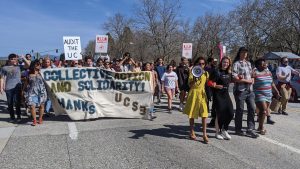
UCSC graduate students on strike, March 2020. Photo: Mat Weir, via GoodTimes
The CAA Advocacy Committee approved the following statement in March 2020.
CAA condemns the termination of employment for graduate student strikers at the University of California, Santa Cruz, calls for their reinstatement, and urges the university to commence negotiations with the students as soon as possible. This action has affected graduate students in the visual arts, which will impact their lives in serious ways, including the loss of medical insurance and residency status. We consider that their demands for an appropriate augmentation of salary in line with the increased costs of living are legitimate and note that they now have the support of the UAW, with whom the university is contracted.
Graduate students are indispensable workers who cannot be expected to execute their teaching duties and to pursue their own research when housing and food costs are not affordable with their current wages. CAA maintains that graduate students should be compensated at a level that makes it possible for them to flourish on campus as research assistants, teachers, and emerging scholars. A fair wage correlated with cost of living increases is a necessary precondition for their own work, essential to fulfilling the educational mandate of their departments, and essential for the dignity of all workers at the university. To punish students for exercising their rights to demand a decent wage is, in our view, unjust and unacceptable, and all penalties should be reversed immediately.
Further Reading
UC Graduate Students Threaten More Strikes as Movement Grows (Los Angeles Times)
Why We’re Striking for Fair Teaching Wages at UC Santa Cruz — Even With a Baby on the Way (Washington Post)
California University Fired 54 Grad Students Who Were Striking for Higher Pay (CNN)
Why Graduate Students at UC Santa Cruz Are Striking (New York Times)
CAA Standards and Guidelines for Part-Time Professional Employment (CAA)
CAA Affiliate ACSAA Condemns the Assault on Democratic Institutions and Intellectual Freedoms in India
posted by CAA — January 17, 2020
The American Council for Southern Asian Art (ACSAA), a CAA Affiliate Society, has condemned the ongoing assault on democratic institutions and intellectual freedoms in India. Read their statement below.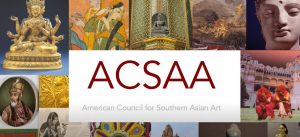
The American Council of Southern Asian Art (ACSAA), a non-profit organization and a community of academics and humanists, condemns the ongoing assault on democratic institutions and intellectual freedoms in India.
Both the Citizenship Amendment Act (CAA), signed on 11 December 2019, and the National Register of Citizens (NRC) Act, to be implemented in 2021, are openly discriminatory laws. We denounce any attempt at exclusion based on religion, caste, gender, race, or sexual identity, and find both laws to be antithetical to the Indian constitution and its democracy. In particular, as researchers and teachers of India’s art and architecture across millennia, we are committed to preserving the rich contributions of Muslims to its visual culture and intellectual life. We see this commitment as directly threatened by the violent, often state-sanctioned, erasure of such contributions, in instances such as the demolition of the Babri Masjid, the occupation of Kashmir, the renaming of cities, and the rewriting of academic curricula along Hindutva lines.
We stand in full support of the students and teachers at Aligarh Muslim University and the Jamia Millia Islamia, following the events of 15 December 2019; at Jawaharlal Nehru University, following events there on 5 January 2020; and everyone currently participating in peaceful protests and demonstrations across the country. We see the brutal attack at JNU—organized and executed by members of the Akhil Bharatiya Vidyarthi Parishad (ABVP), the student faction of the Hindutva organization, the Rashtriya Swayamsevak Sangh (RSS) and, with the ruling Bharatiya Janata Party (BJP), a member of the Sangh Parivar—as one more instance of a widespread denial of the rights of Indian citizens to critique their government peacefully and openly.
The accusations of “anti-nationalism” directed at marginalized communities at these confrontations – particularly Muslims, Dalits, and women – are reminders of the extent to which extremists will go to erode the secular principles on which the country was founded.
To date, there have been no arrests or investigations into the identity of the attackers at JNU, despite indisputable evidence. We deplore the negligence of the Delhi Police, who looked on as the attacks happened, and call for both an immediate investigation and the resignation of JNU’s Vice Chancellor, M. Jagadesh Kumar. Following as it does the instances of police violence at Aligarh Muslim University and Jamia Millia Islamia, as well as long-term interventions including cuts to funding and fee hikes, the JNU attack urgently increases our concern, as part of the global academic community, for public higher education and critical thought in India.
The American Council for Southern Asian Art (ACSAA) is dedicated to advancing the study and awareness of the art of South and Southeast Asia and the Himalayan regions, spanning all periods and forms of artistic production.
Related reading: In Photos: The World’s Largest Democracy Is in Upheaval (Quartz India, December 15, 2019)
Police Fire Tear Gas as Delhi Protesters Decry Citizenship Law (Al Jazeera, December 15, 2019)
I Saw Police Stand by as Masked Men Attacked Students at a Top Delhi University. It Was Yet Another Assault on India’s Intellectuals (Time, January 8, 2020)
Behind Campus Attack in India, Some See a Far-Right Agenda (New York Times, January 10, 2020)
CAA Endorses ACASA’s Statement Concerning Destruction of Cultural Patrimony in Bafut
posted by CAA — December 16, 2019
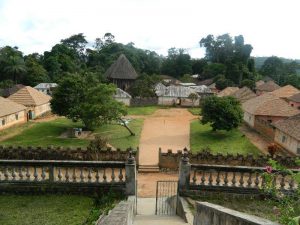
On September 24, soldiers from the Rapid Intervention Battalion (BIR) attacked and looted the Royal Palace, in Bafut, North-West region. © Creative Commons/ShareAlike 3.0, via Human Rights Watch
CAA endorses its affiliate society, the Arts Council of the African Studies Association (ACASA), in condemning recent reports of theft, property damage, as well as violence at the Palace of Bafut in Cameroon.
The site is an important part of the history and culture of the Bafut population in the northwest region of Cameroon, and continues to function as a center for religious rites and ceremonies. The violence and destruction to the Bafut Palace threatens the safety and identity of the Bafut people and the maintenance of their distinctive cultural traditions. As such it deserves protection from the Republic of Cameroon and pressure from organizations and governments to restore damaged structures and return stolen artifacts.
Read ACASA’s statement below.
Statement Concerning Destruction of Cultural Patrimony in Bafut
20 November 2019
The Arts Council of the African Studies Association (ACASA)—an independent professional association which exists to facilitate communication among scholars, teachers, students, artists, museum specialists, collectors, and all others interested in the arts of Africa and the African Diaspora—condemns the violent aggression perpetrated by the Republic of Cameroon against the Palace of Bafut, a site included on UNESCO’s Tentative List of World Heritage Sites since 2006. Human Rights Watch reports that “On September 24 [2019], soldiers from the Rapid Intervention Battalion (BIR) attacked and looted the Royal Palace in Bafut, North-West region.” (https://www.hrw.org/news/2019/10/11/world-heritage-site-attacked-cameroon#) Fon Abumbi II of Bafut protested the aggression in a letter dated September 24, 2019 and addressed to the Governor of North West Region. In addition to causing damage to buildings within the palace and perpetrating violence against those who had been neither charged nor tried in a court of law, these troops representing the authority of the State shamelessly stole historical objects from the palace museum.
According to the World Monuments Fund, the palace “embodies Bafut cultural identity and remains a center for religious rites and traditional ceremonies. Over 50 houses are clustered around the site’s spiritual core, Achum Shrine, and are used by the Fon (king), his wives, and the royal court.” (https://www.wmf.org/project/bafut-palace) The palaces and museums of the North West Region of Cameroon serve as invaluable repositories of the long-standing traditions and material cultures of these vibrant kingdoms. These palaces and associated sites—where ritual practices have long been performed—foster and house the heritages, both tangible and intangible of these communities. The violent destruction and looting of such a site may be understood as an attempt to erase the cultural identity of the Bafut population. As a site listed on the Tentative List of World Heritage Sites, Bafut Palace is recognized as holding even greater than just local significance, constituting a primary locus of cultural heritage for the entirety of Cameroon, and indeed the world. The Cameroonian State must treat these places as the internationally significant cultural heritage sites that they are.
ACASA calls on the Republic of Cameroon to protect sites of cultural heritage as required by being party to the 1954 Hague Convention for the Protection of Cultural Property. According to Article 4(3) of the aforementioned convention, it is the obligation of the State “to prohibit, prevent and, if necessary, put a story to any form of theft, pillage or misappropriation of, and any acts of vandalism directed against, cultural property….” In light of this international obligation, the Cameroonian State must bring to justice and punish appropriately those responsible for this heinous act. Furthermore, every effort must be taken to return looted items of cultural heritage to the palace museum of Bafut.
CC:
Paul Biya, President of the Republic of Cameroon
Henri Etoundi Essomba, Ambassador of the Republic of Cameroon to the US
Peter Henry Barlein, US Ambassador to the Republic of Cameroon
Narcisse Mouelle Kombi, Minister of Arts and Culture for the Republic of Cameroon
UNESCO
World Monuments Fund
What Do You Think? On the Victor Arnautoff Murals and Controversial Artworks
posted by CAA — September 09, 2019
Please share your comments using the form at the end of this post.
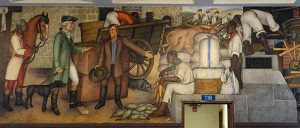
One of thirteen The Life of Washington murals by Victor Arnautoff, George Washington High School, San Francisco. Image courtesy George Washington High School Alumni Association.
CAA invites comments from our members regarding our position on the San Francisco Unified School District and its Board of Education’s decision to destroy, and later its reversal and decision to cover up, WPA-era murals by Victor Arnautoff at George Washington High School.
We spoke out against the initial vote, in opposition to the destruction of works of art and from the hope that creating a contextual reading of the murals might be of some value to the school and its students and an alternative to destroying them.
We also acknowledge that many, including CAA board members, find the murals offensive and damaging to the students’ learning environment, and supported the Board of Education’s decision.
Last month, during a reportedly contentious meeting, the School Board voted to cover up the murals rather than destroy them.
What do you think? Should the murals by Victor Arnautoff be covered up? Should they be destroyed? What are other alternatives?
More broadly, what place do controversial works of art hold in our society? What role do you feel CAA should play in these situations?
We want to know what you think and why. Let us know using the form, below.
CAA Statement on the Removal of WPA Murals by Victor Arnautoff
posted by CAA — July 09, 2019
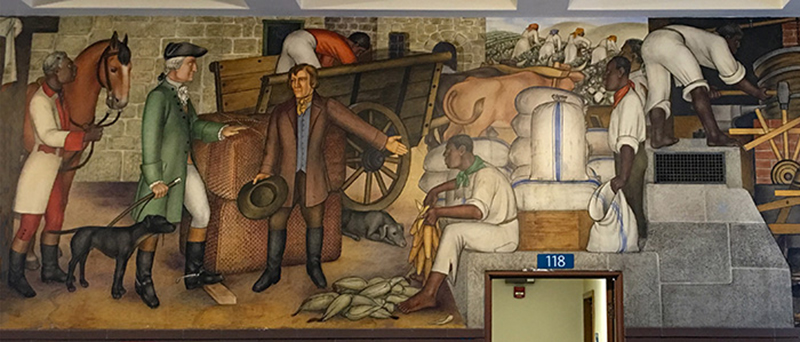
One of thirteen The Life of Washington murals by Victor Arnautoff, George Washington High School, San Francisco. Image courtesy George Washington High School Alumni Association.
On June 25th, the San Francisco Unified School District’s Board of Education voted to destroy an important series of murals by artist Victor Arnautoff, which he painted as part of the Works Progress Administration (WPA) program inside George Washington High School in 1936. The series of 13 murals, entitled The Life of Washington, includes imagery of dead Native Americans and imagery of slaves working at Washington’s Mount Vernon estate in Virginia, which the school board determined was offensive.
CAA opposes the recent ruling by the San Francisco Unified School District and its Board of Education. By voting to destroy the murals, the Board is advancing an agenda of erasing history in order to appease contemporary critics. CAA firmly believes in the preservation of art historical records and works that serve to educate and inform the public. The murals should be viewed as an opportunity to examine history, to ask questions, and to create discussion around ideas, events, and facts that are woven indisputably into American history.

David Raizman
Interim Executive Director
Editor’s note (8/21/19): The views expressed above do not necessarily represent the views of CAA’s membership.
Further reading: San Francisco School Will Cover Controversial George Washington Murals (New York Times)
A Controversial WPA Mural Is a Litmus Test for the Longevity of Public Art (Hyperallergic)
Art Professor Dewey Crumpler Defends Victor Arnautoff’s WPA Murals (National Coalition Against Censorship)



